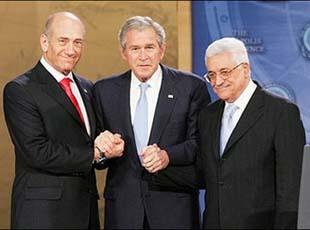World
Israeli carrot and stick approach leads to talks rather than solution
Source: Xinhua | 12-05-2007 07:44
Special Report: Mideast Peace Conference

U.S. President George W. Bush (C) Israel's Prime Minister Ehud Olmert (L) and Palestinian Authority President Mahmoud Abbas shake hands. Bush Tuesday launched his biggest initiative for Middle East peace, brushing aside skeptics by insisting the time is right for Israelis and Palestinians to end their six-decade conflict. (Xinhua/AFP Photo)
JERUSALEM, Dec. 4 (Xinhua) -- Offering Palestinian President Mahmoud Abbas the carrot and Islamic Hamas the stick features Israeli diplomatic efforts towards the Palestinians at large in the Year 2007.
The approach seems a success to guide Abbas to the Annapolis conference to restart stalled peace talks, but still doubted if itwould lead to a two-state solution as well as the end of Israeli-Palestinian conflicts.
CARROT TO MODERATE ABBAS
Trying to shake off the dust he bit in the second Lebanon War in August, 2006, which overshadowed his political image and undermined his career, Israeli Prime Minister Ehud Olmert began to struggle for a diplomatic way leading to peace talks as well as the security which Israeli public is mostly concerned about.
Olmert successfully guided Abbas to a meeting table on Dec. 23,2006 and vowed to take a series of concrete steps to improve the Israeli-Palestinian situation in efforts to bring peace to the region.
At the meeting, announced as to mark the first substantial talks between Israeli and Palestinian leaders in 22 months since Abbas' last formal meeting with then Israeli Prime Minister Ariel Sharon in February 2005, Olmert told Abbas that it was time to proceed in the peace process as the Palestinian and Israeli people had suffered enough.
During the meeting, Olmert and Abbas reached a series of concessions, including the transfer of 100 million U.S. dollars in frozen taxes which were collected by Israel on behalf of the Palestinian National Authorities (PNA).
On the following day, Olmert briefed the Israeli cabinet that his meeting with Abbas was a good meeting, and he planned to continue to meet Abbas in order to implement the joint understandings and the diplomatic agenda Israel wish to promote.
The Israeli cabinet unanimously approved the release of part of withheld Palestinian funds the following day after the Olmert-Abbas meeting.
Olmert also agreed to dismantle a number of checkpoints and roadblocks in the West Bank and take measures to make the daily life of Palestinians easier.
On the eve of a summit among Olmert, Abbas and Egyptian President Hosni Mubarak held at Egypt's Red Sea resort Sharm el-Sheikh in June, a total of 250 prisoners were released in a gesture of goodwill followed by 90 more in September for Muslims' holy fasting month of Ramadan.
The measures were seen by the Israeli government as goodwill gestures to bolster the moderate PNA Chairman Abbas, who is involved in power struggle with the ruling Hamas movement which refused to recognize Israel.
Since the ice-breaking meeting, Olmert and Abbas has had regular meetings as frequent as one or two in a month through the whole year of 2007.
STICK TO RADICAL HAMAS
It was the unexpected event of Hamas' takeover of the Gaza Strip on June 14 which helped Israel to speed up its carrot and stick approach, although Israel has prepared bigger stick for its arch foe Hamas since the beginning of this year.
Despite the involvement of secular Fatah in newly formed unity government led by Hamas on March 17, Israel still gave the cold shoulder to the Palestinian coalition, calling the platform of the coalition "very problematic."
However, the fledgling unity government fell apart after scant three months when Hamas routed Fatah and thus took control of the Gaza Strip.
The factional infighting left the Palestinians two administrations, a Hamas-controlled one in Gaza and a caretaker government installed by Abbas in the West Bank.
Following Hamas' violent takeover of Gaza, Israel has been holding a clear position: the PNA headed by Abbas would receive full support, while Hamas' regime in Gaza must be undermined in any possible way.
After the Gaza "coup", Israel closed crossings with Gaza almost entirely, allowing in only humanitarian aids.
Furthermore, Israel declared on Sept. 19 the Hamas-controlled Gaza Strip a "hostile entity" and announced a plan of reducing power and fuel supplies to the enclave as response to the frequent rocket attacks launched by Palestinian militants in Gaza.
Once the cutoff plan is put into effect, it would make Gaza Palestinians' life from bad to worse as Gaza's population, largely impoverished, almost entirely relies on Israeli supplies of power, water and fuel.
While tightening its blockade on Gaza, Israel called on Egypt to strictly control its borders with Gaza to prevent arms smuggling into the enclave.



